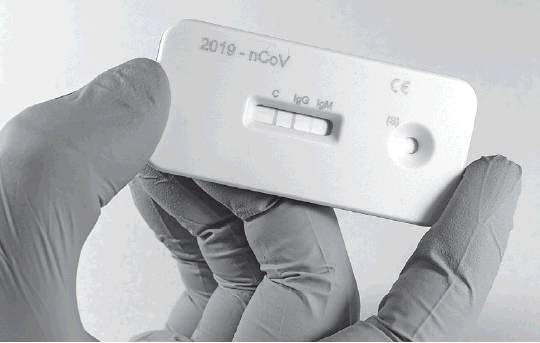Lubbock has antibody tests, but they may not be telling us much
By Matt Dotray A-J Media
UMC Health and Covenant Health Systems began offering antibody tests this week, the test that says whether someone already had COVID-19.
Results could show a wider spread of the coronavirus in Lubbock than originally thought. What it won’t show is when someone had COVID-19, meaning there likely can’t be any significant contact tracing associated with positive tests. There’s also no way of knowing how someone came into contact with the virus.
And there’s no definitive answer as to whether someone who’s had COVID-19 is immune to getting it again, so even individuals who’ve had the virus are being told to social distance, wear a face covering and avoid leaving the house as much as possible.
As to what it can show - which is whether COVID-19 is more widespread than the numbers show - Katherine Wells, public health director, said on Friday there’ve been very few positive antibody tests.
“We don’t know how long the antibodies last in the body, we don’t know how protective they are about getting reinfected, so right now it’s really more of a surveillance tool,” Wells said. “It’ll just show what portion of our community has been infected.”
What some coastal cities are seeing is theories that COVID-19 has been around longer — someone tests positive for the antibodies and recalls showing symptoms in February or earlier.
Wells said that doesn’t look to be the case in Lubbock.
“I think we knew pretty quickly when it was here in Lubbock because we were already looking for it,” Wells said. “But out on the coasts, it may show there were some earlier cases.”
Covenant Health began offering antibody tests on the first Wednesday in May. Wells said fewer than 10 have come back positive. More testing will be done, but Wells said there’s no sign that COVID-19 went significantly undetected.
Antibody testing is being offered through Covenant Health inside two wellness buses parked at the Covenant Health Southwest Medical Park just west of 98th Street and Slide Road. Testing will be done from 8 a.m. to 4 p.m. Monday through Friday.
UMC began offering COVID-19 antibody testing at its clinics on Friday.
“This blood test, with next-day results, can tell you if you have developed antibodies to fight the infection,” UMC wrote in a news release.
Antibodies are found by testing a collected blood sample. The body makes proteins to fight off the infection, so the antibody test looks for these proteins. The testing looks for the IgG antibody, which Ron Cook, Lubbock health authority, says becomes detectable about three weeks after symptoms onset.
Wells isn’t certain how long these antibodies are detectable, but she said early research shows it’s beyond seven weeks.
Less than 1% of tests are positive in Lubbock County, Wells said. If it was more widespread, Wells said eventually the citizens would have “herd immunity,” which is when there’s enough immune people (assuming the antibodies mean you’re immune) to slow disease transmission.
The good thing about testing positive for these antibodies is the donation of plasma. Hospitals in the area, as well as all over the country, are running tests using convalescent plasma from recovered patients in severely-ill patients with the coronavirus.
“After a person has recovered from COVID-19, antibodies to the virus develop,” reads a news release from the Texas Tech University Health Sciences Center. “After the plasma of such a recovered patient is collected, it is then infused into a person still fighting the infection. This offers a sick patient an opportunity to benefit from antibodies made from the donor that are specific to the new virus. The approach has been used to treat other viral infections such as Ebola and SARS.”
Wells said the hospitals in Lubbock are actively seeking donors. She said this treatment is still being studied.
Something that was discussed during Thursday’s city news conference was what exactly to do with this information. The city doesn’t know if it should count these positive antibody tests in the total numbers since it’s no longer an active case. The numbers are supposed to show the current situation, and any positive antibody results don’t help paint the picture.
Wells said the health department can’t do much contact tracing since the tests don’t say when the person had the virus. The health department can test the immediate family and people who often come into contact with that person, but that’s about it.
Wells said she’s waiting for more guidance from the state on what exactly to do with this information.

